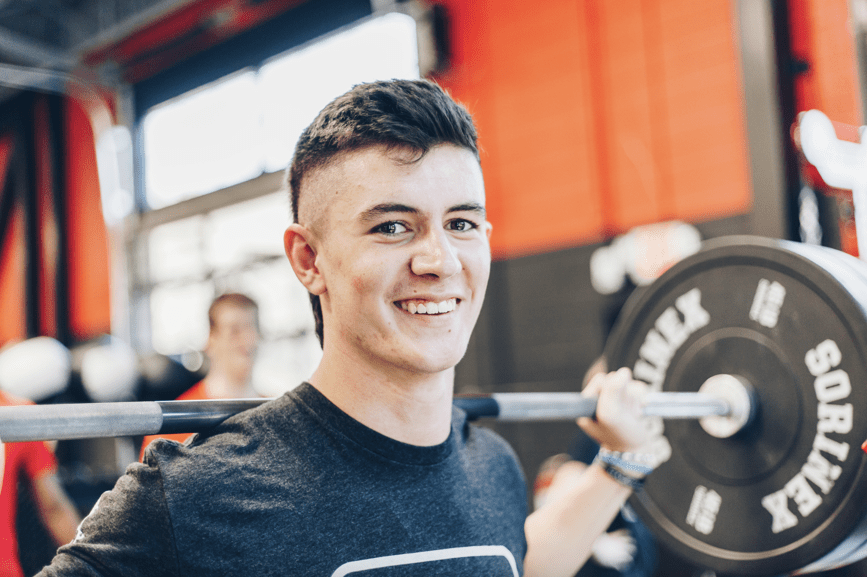The Importance of Strength Training for Young Athletes
Strength training is gaining more and more recognition as a key part of young athletes' development. In this article, we'll take a friendly look at why strength training matters so much for young athletes in various sports. We'll chat about the many ways it can boost their bodies and minds. Plus, we'll dive into some research to really drive home why it's critical to include well-structured strength training in the routines of our future sports stars. It's all about helping them perform their best and stay safe while doing what they love! 🏋️♂️🌟
Youth participation in organized sports has seen a steady rise over the years, with young athletes striving for excellence in various disciplines. To optimize their potential and minimize the risk of injuries, young athletes should engage in well-designed strength training programs. Strength training is an essential aspect of their overall development, contributing to improved performance, injury prevention, and long-term athletic success.

Physiological Benefits of Strength Training for Young Athletes:
Bone Health:
Strength training plays a pivotal role in enhancing bone density and strength, crucial for the growth and development of young athletes. The study conducted by Ribeiro-Dos-Santos et al. (2017) in the "Journal of Bone and Mineral Metabolism" demonstrates that weight-bearing exercises, such as resistance training, stimulate bone remodeling and increase bone mineral density in adolescents. This contributes to reduced injury risk, particularly in high-impact sports.
Muscle Development and Growth:
Strength training stimulates muscle growth and development in young athletes. According to a study by Faigenbaum et al. (2009) published in the journal "Pediatrics," strength training can be safe and effective for children and adolescents when appropriately supervised. Improved muscle mass and strength provide a foundation for enhanced sports performance, as increased force production leads to improved speed, power, and endurance.
Injury Prevention:
Participation in sports carries inherent injury risks for young athletes. Strength training helps reduce these risks by improving joint stability, muscular imbalances, and neuromuscular control. The research conducted by Myer et al. (2011) and published in the "American Journal of Sports Medicine" highlights the effectiveness of strength training in reducing the incidence of anterior cruciate ligament (ACL) injuries among young athletes. Properly designed strength programs can enhance neuromuscular coordination and proprioception, crucial for injury prevention.
Psychological Benefits of Strength Training for Young Athletes:
Confidence and Self-Esteem:
Strength training not only improves physical attributes but also positively impacts psychological aspects. Young athletes who engage in strength training often experience enhanced self-confidence and self-esteem. As they witness their physical progress and increased strength, they develop a greater sense of self-worth, which can translate into improved sports performance.
Mental Toughness:
Strength training requires discipline, perseverance, and mental fortitude. These attributes developed in the gym can transfer to the playing field, helping young athletes handle pressure and adversity more effectively. The mental resilience gained from overcoming challenges in strength training can prove invaluable in competitive sports environments.
Neurological Benefits of Strength Training for Young Athletes:
In addition to the physiological and psychological benefits, strength training offers significant neurological advantages for young athletes. These benefits encompass enhanced neuromuscular coordination, improved proprioception, and increased motor skill development.
Neuromuscular Coordination:
Strength training involves controlled movements and precise muscle activations, which enhance neuromuscular coordination. Young athletes who engage in strength training develop a greater ability to recruit specific muscles and execute complex movements efficiently. This heightened coordination translates directly to improved sports performance, as athletes can execute skills and techniques with greater precision and accuracy.
Proprioception:
Proprioception, the sense of the body's position in space, is crucial for athletic success. Strength training exercises challenge proprioceptive feedback systems, as athletes must control their bodies through various ranges of motion while under resistance. This heightened proprioception leads to improved balance, stability, and agility, which are essential for sports that require quick changes in direction and precise movements.
Motor Skill Development:
Strength training involves mastering proper lifting techniques and movement patterns, which can transfer to the acquisition of sport-specific skills. The enhanced motor skill development from strength training can be especially beneficial for young athletes in sports that demand intricate movements or precise techniques, such as gymnastics, figure skating, or martial arts.
Cultivating Healthy Habits:
Beyond the immediate physical and neurological benefits, incorporating strength training into the lives of young athletes promotes the development of lifelong healthy habits. These habits extend well beyond their athletic careers, contributing to overall well-being.
Lifestyle of Physical Activity:
Strength training instills the importance of regular exercise and physical activity from a young age. Young athletes who engage in strength training are more likely to continue an active lifestyle as they grow older, reducing the risk of sedentary behavior and associated health issues.
Injury Prevention and Longevity:
By teaching proper exercise techniques and emphasizing the importance of injury prevention, strength training encourages young athletes to prioritize their long-term health. Understanding how to protect their bodies and prevent injuries through strength training can lead to healthier, more resilient bodies in adulthood.
Nutritional Awareness:
Strength training often goes hand-in-hand with nutrition education. Coaches and trainers often emphasize the importance of proper nutrition to support training goals. This nutritional awareness can help young athletes make informed dietary choices, promoting healthy eating habits that extend beyond the gym or sports field.
Incorporating strength training into the lives of young athletes not only enhances their athletic performance but also offers a myriad of neurological benefits and cultivates healthy habits. The improved neuromuscular coordination, proprioception, and motor skills developed through strength training contribute to overall athleticism. Furthermore, these young athletes are more likely to lead active, injury-free lives and make healthier choices in nutrition and lifestyle as they mature. As such, strength training should be regarded as a crucial component of youth sports development, benefiting young athletes both in the present and throughout their lives. Coaches, parents, and sports organizations should embrace this holistic approach to youth sports training to nurture well-rounded and resilient individuals.
References:
Anderson, C. E., Sforzo, G. A., & Sigg, J. A. (2008). The effects of combining strength and skill training on the performance and fitness of competitive gymnasts. Journal of Strength and Conditioning Research, 22(1), 159-165.
Bergeron, M. F., Mountjoy, M., Armstrong, N., Chia, M., Côté, J., Emery, C. A., ... & Malina, R. M. (2015). International Olympic Committee consensus statement on youth athletic development. British Journal of Sports Medicine, 49(13), 843-851.
Faigenbaum, A. D., Kraemer, W. J., Blimkie, C. J., Jeffreys, I., Micheli, L. J., Nitka, M., & Rowland, T. W. (2009). Youth resistance training: Updated position statement paper from the National Strength and Conditioning Association. Journal of Strength and Conditioning Research, 23(5 Suppl), S60-79.
Ribeiro-Dos-Santos, A., Vilela-E-Silva, A. C., & de Campos-Falcao, M. A. (2017). Effects of resistance training on bone mineral density and content in adolescent females. Journal of Bone and Mineral Metabolism, 35(3), 238-247.
Myer, G. D., Ford, K. R., Paterno, M. V., Nick, T. G., & Hewett, T. E. (2011). The effects of plyometric versus dynamic stabilization and balance training on lower extremity biomechanics. The American Journal of Sports Medicine, 39(2), 443-455.
